WASHINGTON, D.C., USA — Maine Republican Sen. Susan Collins is urging the Biden administration to reevaluate the ongoing travel restrictions between the U.S. and Canada. Collins said the border closure has created significant disruptions for people and businesses, despite the often lower localized risk for COVID-19 transmission in rural border areas.
On Feb. 20, the U.S. Department of Homeland Security said the United States, Canada, and Mexico are extending the restrictions on non-essential travel at our land borders through March 21, 2021, amid the ongoing coronavirus pandemic.
In a letter dated Feb. 16, Collins wrote to Department of Homeland Security Secretary Alejandro Mayorkas addressing her concerns over keeping the border closed to non-essential travel.
“Due to the ongoing COVID-19 pandemic, strict travel restrictions at land ports of entry between the United States and Canada have been in effect for nearly one calendar year,” Collins wrote.
Collins said, "these restrictions should reflect the localized risk levels along our border, and allow for certain common-sense exceptions, such as visits among close relatives or day-to-day local commerce in low-COVID-19 transmission areas."
In her letter, Collins included previous letters she wrote to former President Donald Trump and former Acting Secretary Chad Wolf advocating for limited border crossing exemptions based on localized risks.
In a letter to Wolf in June, Collins wrote that there were fewer than 180 total confirmed cases of COVID-19 in rural border areas like Aroostook and Washington counties.
“The risks of significant cross-border transmission among those jurisdictions appear to be low at this time,” she wrote. “Just as American states have begun to loosen restrictions on certain activities, an absolute restriction on non-essential travel across the entire U.S.-Canada border should be reevaluated.”
"These areas rely on one another for essential supplies, and family members frequently live on opposite sides of the border, creating tight-knit, cross-border communities," Collins continued in her letter to Wolf. "As states and localities in the interior of the nation continue to reopen, I am concerned that border communities that have historically depended on day-to-day cross-border commerce will be left behind, even as their risk of COVID-19 transmission appears to remain low."
She asked that the administration consider designating some travel, such as among family members or to local businesses near the border, as "essential travel."
Currently, Aroostook County, which borders New Brunswick, Canada, has a case rate of 188.3 per 10,000 people, according to data from the Maine CDC.
But restrictions have remained.
“While I appreciate the need to limit nonessential travel into the United States in order to prevent further spread of COVID-19, these restrictions should reflect the localized risk levels along our border, and allow for certain common-sense exceptions, such as visits among close relatives or day-to-day local commerce in low-COVID-19 transmission areas,” Collins wrote in her recent letter to Mayorkas.
Collins wrote that it’s her hope to be able to work with Mayorkas on an “equitable solution” for the communities on the northern border, which she says have suffered due to the restrictions.



